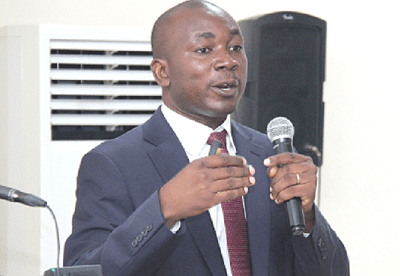THE persistent review of existing taxes and the introduction of new ones on a regular basis imposes additional cost on businesses, an economist has said.
Economist and professor of finance at the University of Ghana, Professor Godfred Bokpin, said compliance costs associated with businesses in meeting tax requirements posed a significant challenge, impacting their financial resources and operational efficiency.
It also stifles entrepreneurship, discourages investment and creates barriers for small businesses which in turn impede job creation and hinder the country’s ability to attract and retain businesses, he added.
Prof. Bokpin said: “I am aware of the huge cost implications on businesses such as those in the banking and manufacturing sectors need to invest in specialised software, hire tax consultants, and allocate significant time and effort to navigate complex tax codes.”
Consequently, he urged government to balance revenue generation without burdening citizens or businesses with excessive taxes and costs.
Prof. Bokpin was taking his turn on a live discussion on X Spaces (formerly Twitter) hosted by the Graphic Business last Thursday on the theme: “What the Economy Will Look Like in 2024.”
Holistic tax review
Earlier, the economist and finance expert had called on Ghana to have a holistic review of its tax policies to, as he puts it, balance revenue needs, private sector growth and household financial well-being.
The call comes at a time when governments, past and present, have consistently perceived the introduction of new taxes as necessary for economic growth and sustainability, ignoring the impact of such numerous taxes on economic activities.
A couple of weeks past, the Ministry of Finance announced the implementation of a 15 per cent Value Added Tax (VAT) for residential customers of electricity above the maximum consumption level specified for block charges for lifeline units in line with Sections 35 and 37 and the First Schedule (9) of Value Added Tax (VAT) Act, 2013 (ACT 870), effective January 1, this year.
The move, which forms part of the implementation of the Government's Medium-Term Revenue Strategy and the International Monetary Fund (IMF) Supported Post-Covid-19 Programme for Economic Growth (PC-PEG), has sparked wide public outcry and condemnation because of the impact on the already bad economic conditions businesses, individuals and households face.
Some even fear that the tax on electricity and others is likely to affect the country’s growth targets as the move is expected to increase the cost of operation and slow production. It is also likely to worsen the already bad unemployment situation in the country, which the government is struggling to tackle.
Impact
Professor Bokpin, told the Graphic Business in an interview when asked about the impact of the new taxes on the economy that the VAT on electricity consumed, as introduced by the government, would have a negative impact on households and businesses at large.
He said the numerous taxes introduced by the government since the outbreak of COVID-19 were worrying and needed to be addressed immediately to help foster positive growth in the country, stating: “No country has ever developed by taxing its people the way we are doing.”
We need to take another look at our tax policy so that we strike an appropriate balance between raising revenue, preserving private sector competitiveness and also creating fiscal space for households.”
“There's no way the average Ghanaian can save and any country that is not saving is not accumulating any capital, let alone taking advantage of economic opportunities. That country will be open to excessive foreign dominance and ultimately, it will not augur well for redistribution of wealth,” Prof. Bokpin said.
He further argued that Ghana needed a reset and “we need politicians to recognise that the path that we are on now, though it will bring some temporary relief, is dangerous”.
“We are pushing increasingly to the point where the people may not be able to bear it and the situation can explode,” he warned.
